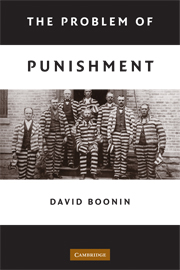5 - The Appeal to Necessity
Published online by Cambridge University Press: 05 June 2012
Summary
OVERVIEW
The problem of punishment arises from the fact that when the state punishes people for breaking the law, it subjects them to various treatments that are intentionally harmful. Typically, it is impermissible to do an act with the intention of harming another person. A successful solution to the problem of punishment must therefore explain why the fact that a person has broken a just and reasonable law makes it morally permissible for the state to treat him in ways that would otherwise be impermissible. In Chapter 1, I argued that this problem posed by the practice of punishment is a genuine moral problem, and in Chapters 2–4, I argued that none of the attempts to solve the problem that have been offered in the voluminous literature on the subject are successful.
Let us now suppose that I have been correct about all of this. What should we do? At a general level, there are only two possible answers to this question: we can continue to punish and hope that a satisfactory defense of its permissibility will eventually emerge, or we can abolish the practice, at least until a satisfactory defense of its permissibility can be provided. The first option strikes me as morally repugnant and the second as morally imperative. In no other realm of human interaction would we allow one group of people to intentionally inflict serious harm on another if no satisfactory justification for the moral permissibility of this practice was available.
- Type
- Chapter
- Information
- The Problem of Punishment , pp. 213 - 276Publisher: Cambridge University PressPrint publication year: 2008



